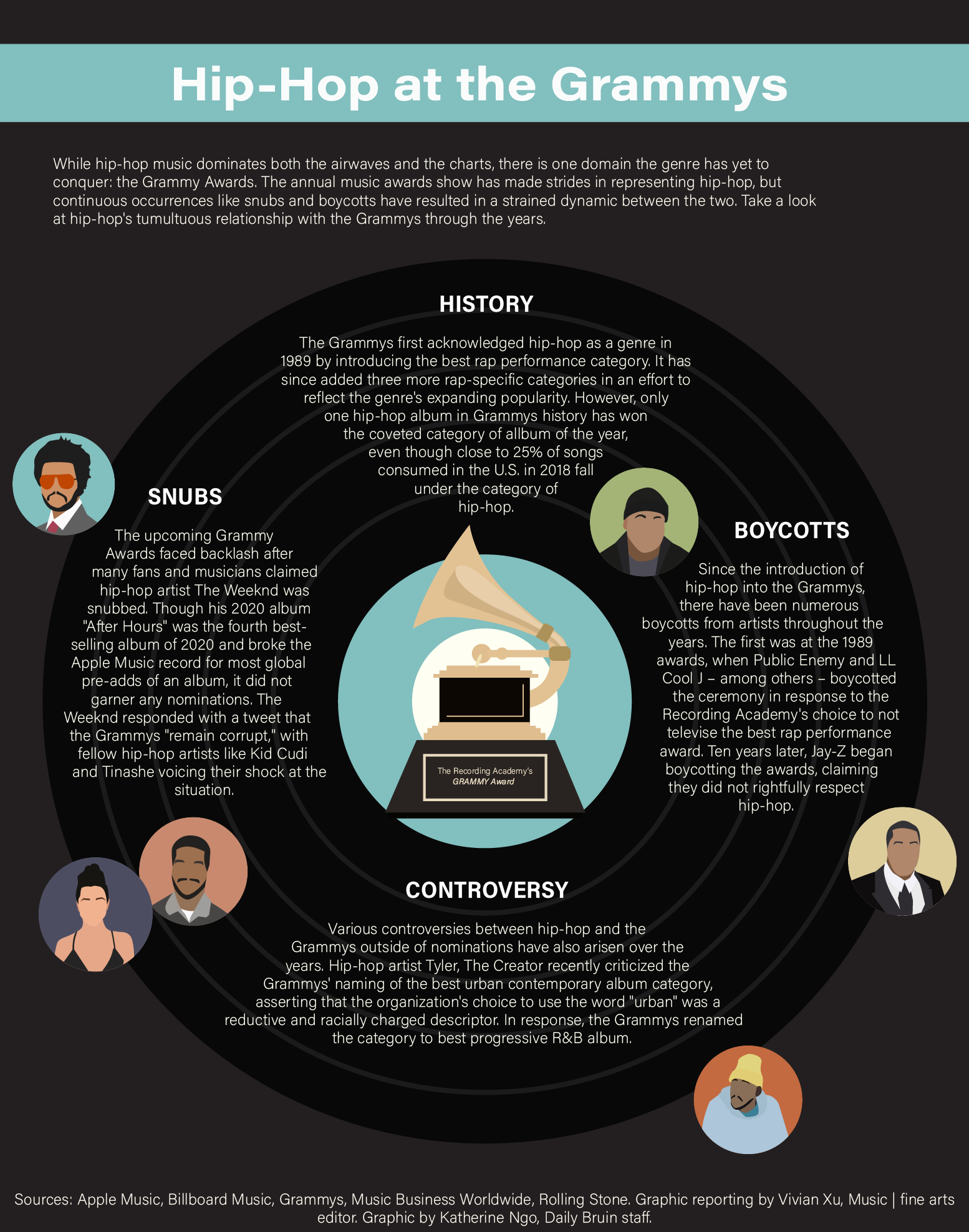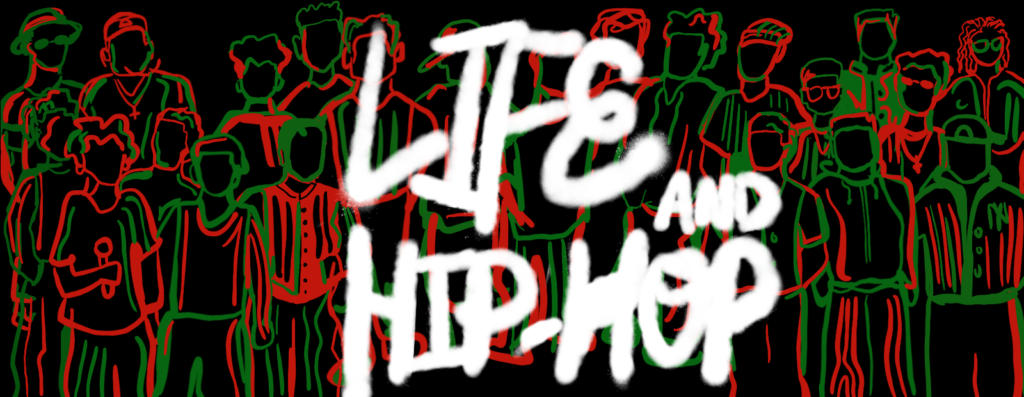Life and Hip-Hop: Grammy Awards have long history of snubbing hip-hop, Black artists

By Natalie Brown
March 3, 2021 7:13 p.m.
The impact of music extends far beyond the play and pause buttons. Formed in the 1970s as an underground movement, hip-hop has expanded into various art forms and musical subgenres – with rap specifically being one of the most popular musical styles among today’s youth. In “Life and Hip-Hop,” columnists Natalie Brown and EJ Panaligan explore and analyze how hip-hop intersects with and influences everyday aspects of life.

The Grammy Awards celebrate the best and brightest in today’s music industry – but also the whitest.
With a history of racial bias and disregard for rap music, the Grammy Awards have had a long and tumultuous relationship with hip-hop. And as the genre has skyrocketed to unprecedented popularity, the Recording Academy has failed to accurately represent or acknowledge the influence of hip-hop on other forms of music and culture. In turn, the biggest hip-hop artists and fans alike place minimal weight on the Grammys’ nomination decisions and awards shows.
As hip-hop began to ascend in the 1980s, conversations arose regarding its inclusion in the Grammy Awards show. Hip-hop journalist Adam Aziz said while the relationship between the Recording Academy and the hip-hop world was already rocky, it officially turned sour after DJ Jazzy Jeff and The Fresh Prince boycotted the 1989 awards show. Though the pair won the award for best rap performance for their song “Parents Just Don’t Understand,” they refrained from attending the show in protest of the Grammys’ choice to not televise their performance.
“Ever since (1989), there’s been this strange relationship between hip-hop and the Grammys that’s never really gotten to the right place,” Aziz said. “I think that (the Grammys’ negligence of hip-hop and the 1989 boycott) are two of the big reasons why.”
More than two decades later, the Grammys’ relationship with hip-hop became more strained after Macklemore and Ryan Lewis’ “The Heist” won 2013’s best rap album over Kendrick Lamar’s “good kid, m.A.A.d city.” Regarded as one of the most poignant and influential albums of all time, Lamar’s album was much more than a collection of songs – the cultural legacy left on the genre was long-standing, Aziz said.
“If you’re looking at the importance of albums and the history of the genre, to have that award go to Macklemore when Kendrick’s winning the Pulitzer Prize, (it shows) that the cultural impact is often ignored,” Aziz said.
[Related: Second Take: Are 2019’s Grammy nominations wrongful snubs or fair judgements?]
For this year’s Grammys, a similar tune rings true. Though the awards are set to air March 14, hip-hop journalist KB Denis said there have already been many hip-hop snubs from artists who didn’t receive substantial nominations for their work this year. Pop Smoke’s posthumous album “Shoot For The Stars Aim For The Moon” and Roddy Ricch’s album, “Please Excuse Me for Being Antisocial” both received a measly number of nominations in comparison to their mainstream success and legacy.
Not only were the incidents major artistic snubs, but Denis said this history of hip-hop artists being robbed is indicative of a much larger issue of diversity within the Grammys. Many awards institutions such as the Grammys have issues with racial bias because at the end of the day, Denis said they are extensions of white supremacy and a history of white society attempting to validate Black art.
“Rap is the biggest genre in this country, birthing some of the most innovative and genius artists of our time,” Denis said. “And the Grammys have chosen not to recognize that – it was a conscious decision.”
Composed of a selection committee that is disproportionately white and male, the Recording Academy needs to be doing more to initiate members of a diverse demographic, he said. This is echoed by hip-hop artist The Weeknd’s recent tweet “The Grammys remain corrupt. You owe me, my fans and the industry transparency,” posted after receiving zero Grammy nominations, though his 2020 album “After Hours” debuted at the No. 1 spot on the Billboard 200 chart. Denis said the artist’s comments were a call-to-action for the Grammys to reinvent their selection and committee formats to adapt to both the diversifying music industry and hip-hop listenership.
[Related: Hip-Hop in Motion]
While the Grammys may be at the top of the food chain in terms of music awards, Denis said their position doesn’t mean the award is necessarily a direct indicator of success in the music industry. With the popularization of music streaming services, Aziz said awards shows are becoming a dated format, and listeners now have the power to decide what constitutes a good album.
“Hip-hop fans, or the people consuming hip-hop music through streaming services, don’t care about the Grammys,” Aziz said. “Very few people care about the Grammys anymore, except for the Grammys. It’s a very outdated brand.”
Major modern-day hip-hop artists, such as Drake, have also boycotted the awards, which Aziz said raises many questions as to how the televised format can adapt to an increasingly digital music space and begin to mend its relationship with hip-hop. However, Aziz said he doesn’t expect much.
“Short of the Grammys throwing a significant bone and dedicating a large portion of the show to the (hip-hop), I think (a relationship between hip-hop and the Grammys) is probably just something that is never going to be totally on the same page,” Aziz said.


